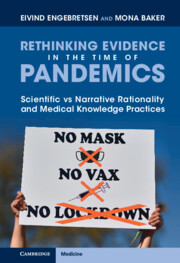Contents
3Whose Evidence? What Rationality? The Face Mask Controversy
4Whose Lives? What Values? Herd Immunity, Lockdowns and Social/Physical Distancing
5The Rational World Paradigm, the Narrative Paradigm and the Politics of Pharmaceutical Interventions
6Objectivist vs Praxial Knowledge: Towards a Model of Situated Epistemologies and Narrative Identification



